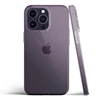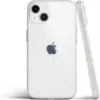Apple’s big September event (tagline: It’s Glowtime) gave us a lot to chew on. The company introduced new iPhone 16 and iPhone 16 Pro models, Apple Watch Series 10 with the first design change in a long time, the Apple Watch Ultra 3, two new AirPods 4 models, and an update to AirPods Max.
As usual, the company left some details out of its hour-and-a-half presentation or glossed over some of the things you should probably know. There’s not enough time to cover everything, after all.
Here are some of the interesting details we’ve uncovered while digging into the specs and features of these new products.
All iPhone 16 models have Wi-Fi 7
It wasn’t announced but it did appear on the “features card” in the presentation: iPhone 16 (regular and Pro) has Wi-Fi 7 support. What’s it good for? Better speed, less wireless congestion, and lower latency. In other words, better-performing Wi-Fi, more often.
You probably don’t have a Wi-Fi 7 access point yet, but when you do, your new iPhone will be ready for it. You can read more about Wi-Fi 7 here.
The iPhone 16 Pro Max lasts a long time.
Apple promised longer battery life–the longest ever, in fact. Is that an hour more? Six hours more? 12 percent? They didn’t say.
The spec sheets give us some idea, though. We go into the expanded battery life specs for all the iPhone 16 models in this article, but the short answer is: You should get a good hour or so of battery life in typical daily use—and if you’re upgrading to an iPhone 16 Pro Max, you’ll get a whopping four hours more of use.
The iPhone 16 Pro Max will last hours longer than the previous model.
Macworld
You’ll have to wait for the coolest feature
A lot of the things Apple talked about are not coming when the products launch. Many are coming in software updates later this year, and others are even further away.
We’ve talked about how Apple Intelligence is a staged release, starting with some features in iOS 18.1 (coming in October) and more in iOS 18.2 and 18.3. It’s a big selling point of the iPhone 16, and it won’t be there right when the phone drops. That also goes for the new Visual Intelligence feature, where you long-press the Camera Control to get AI-powered info on whatever you’re looking at. Apple spent a couple of minutes showcasing the feature, so you may have missed that little bit at the end where Craig Federighi said, “It’s coming to the Camera Control later this year.”
Those new hearing test and hearing aid features for the 2nd-gen AirPods Pro? Also coming later this year.
AirPods Max has a 5-year-old chip
Apple finally updated the AirPods Max, but you’ll notice that Apple isn’t calling this the “second-generation AirPods Max” or “AirPods Max 2.” This is more like when Apple updated the second-gen AirPods Pro’s charge case from Lightning to USB-C—it’s a little different but mostly the same.
it mainly means that AirPods Max aren’t getting the newer H2 chip that’s in the AirPods Pro and AirPods 4. Nor did it get a new design or new features. All new buyers will get are new colors and a USB-C port instead of Lightning for charging purposes only. But you’ll still need to pay $549 for the pleasure.
The AirPods Max look new but they have the same old chip.
Apple
Faster Wireless charging has caveats
Apple announced faster wireless charging for the iPhone 16s, but there are some requirements.
Qi2 charging and regular MagSafe charging is limited to 15 watts. If you have a 30W USB-C power adapter and one of the new MagSafe chargers, only then can you charge wirelessly at up to 25W. At least the charger now comes in both 1-meter and 2-meter versions (for $10 more of course).
Old bands still work with the new Apple Watch
The new Apple Watch Series 10 features a new design that is thinner, lighter, and a little bigger with a larger display and more rounded edges.
Apple didn’t specify this in its presentation, but the connection points to bands haven’t changed. All (or most) of those Apple Watch bands you’ve collected over the years will work just fine with the Series 10.
The Apple Watch Series 10’s new design still supports old bands.
Apple
Where’s JPEG-XL?
A rumor stated that Apple may support the superior JPEG-XL format in the new phones, but it was absent from Apple’s presentation.
According to MacRumors, code in iOS 18 suggests that the iPhone 16 Pro will support capturing images in JPEG-XL (in addition to all the other expected formats). Strange that it’s not on Apple’s spec sheet, so we wouldn’t count on this one until Apple officially announces it.
No mmWave 5G outside the U.S.
All four iPhone 16 variants support those super-fast (and super short-range) mmWave 5G networking in the United States, but Apple is still not expanding support for this aspect of 5G to other countries.
There are mmWave networks in Japan, Singapore, Australia, and other countries in limited locations, but the new iPhones will not support them. Sub-6GHz 5G networks are supported all over the world, however.
Emergency SOS via satellite is still free
When Apple unveiled Emergency SOS via Satellite with the iPhone 14 in 2022, it promised two years of free service. Then last November, Apple extended the service for an extra year, until November 2025. With the iPhone 16, the service is still available for free for two years—but at some point, the bill will come due. Apple has never said how much it will cost, but with several new features—including sending photos and video—there might be sticker shock.





